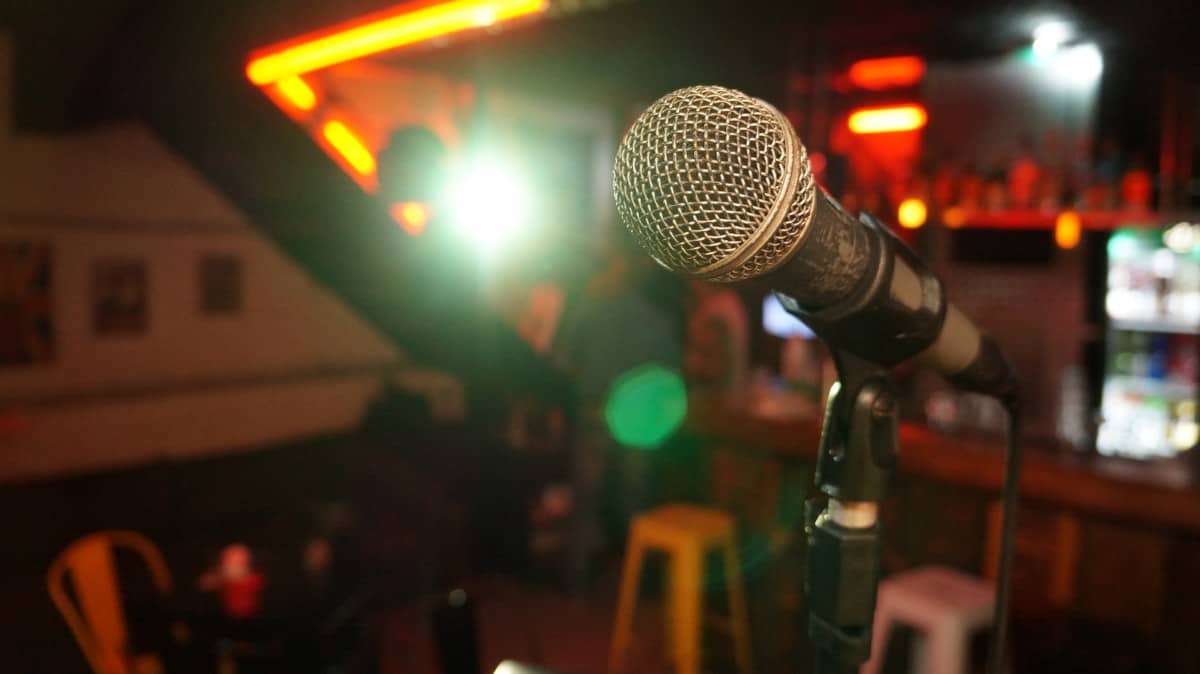Open mics are the most misunderstood and feared places for comedians. They are the training grounds required to hone your craft while working on jokes that may die on that very stage. So what can you expect at your first open mic? How can you prepare for an open mic?
You should expect to wait, watch and listen to other comedians at an open mic. You can prepare by knowing your material, listening to other performers, and knowing that you could be doing your set for just one other person. Open mics are the toughest part of being a comedian, and they never get easier.
An open mic is like entering a fight. Once it starts, there is no turning back. You should be prepared to have a bad set. Every single time. It is different when you are only performing in front of people who know you and see you as someone entertaining. The people that you will meet at open mic venues are those who consider you as their competitor. It is not that easy to get into comedy. Many of the people that you meet at comedy shows have been doing this for a long time already, hoping that someone from the showbiz industry will tap them and offer them contracts.
Open Mics are a crucial part of starting any comedy career. Think of open mics like Rocky training; if you can do your material to an unresponsive crowd without being fazed, you’ve got the chops for comedy. Going to open mics to support friends just getting started is a great way to see how great and how… not-so-great the talent can be.
Many people fear open mics, which is why they avoid places where they might be placed on the spot like on open mic nights or even at coffee bars. If you want to learn stand up comedy, this is something that you should be able to conquer. You need to learn how to get on stage, hold the mic, and perform in front of a crowd.
[spreaker type=player resource=”episode_id=43817807″ width=”100%” height=”200px” theme=”dark” playlist=”false” playlist-continuous=”false” autoplay=”false” live-autoplay=”false” chapters-image=”true” episode-image-position=”right” hide-logo=”false” hide-likes=”false” hide-comments=”false” hide-sharing=”false” hide-download=”true”]
Know The Location And Time Of The Mic.
Open mics pose lots of challenges for someone who aspires to be a comedian. Before you come to the open mic, you should be armed with your best material, and you should have practiced thoroughly at home. Although open mics are a good practice field for people who are dreaming of becoming comedians, many other people have the same dream, and they also frequent places where they can get the chance to perform.
As long as you aren’t being a jerk, telling sexist or racist joke you should not concern yourself with anyone disliking you. There will be comedians who are rude, short, or mocking but know that this is not the norm. So just go with the flow and continue giving your best. There is a lot of jealousy that happens at open mics; this doesn’t mean that if a joke bombs at an open mic, its a bad joke. Comedians can be some of the most judgmental people.
Make sure that you video or audio record yourself during performances at open mics. Watching the videos can help you see your strengths and weaknesses. You can take note of the factors where you are good at and the spots where your jokes or performance are weak. This can help you improve the craft so that you will know better what to do the next time around.
It may sound like lots of hard work to learn stand up comedy, but once you have mastered everything, you will feel rewarded after you have realized your improvement. It will be a greater satisfaction to hear people’s praises and much more if ever you get the chance to become a pro.
Know The Procedures For Getting Time.
When you go to your first open mic, introduce yourself to the host. Be nice. Shake hands. Ask if the specifics about their mic. Introducing yourself gives the host a chance to find you if they move you in the lineup, and gives them the comfort to know you’re in the room before they call your name. There is nothing worse than calling a comedian to the stage who has bailed.
All open mics are different. Some use a bucket and slips of paper to pick comedians, others have a sign-up sheet, and some ask you to email in advance (these are the best). Try to find out how many performers get up for each show, and how many are turned away, so you know which mics are best. Some open mics will let everyone who shows up get up, and some have a time or performer limit.
Know The Layout Of The Room Especially The Light.
Where do you sit? Is there a spot for comedians, or just a general audience? Where do you enter the stage from, and how will you get there your seat? Where is the light?
Shows will let you know you when you’ve got about a minute left on your set. They’ll “light” you from wherever they are, usually off the side of the stage or from the rear of the room. Make sure you know where that light is coming from before you go on stage and keep an eye out for it.
The light also doesn’t mean you stop mid-story, say, “That’s my time.” and run off the stage. You’ve got a minute to add one last joke, or at least finish up your current bit. Make sure that no matter what, you DON’T GO OVER YOUR TIME! It’s disrespectful to the show, the host, the audience, and fellow performers. Take the extra 15 to 30 seconds to finish up your point, but don’t willfully run the light.
When you get on stage, will you leave the mic in the stand or take it out? If you leave it in, make sure you are close enough to it that it picks up your voice. If you take it out, move the mic stand behind you, so it’s out of the way and put it back in once you’re finished. As a first-timer, it can be easier to leave the mic in the stand, but at some point, learn to remove the mic and move the stand.
Know What’s Going On In The Room And Hang In The Room.
Not all comedians pay attention and laugh. Often they spend most of the time on their phone or in their notes and leave after they’ve performed. So mics can sometimes feel like a waste of time.
Never take any single open mic too seriously. You’re going to be at bad open mics all the time, so learn to have fun. Learn to bomb, and make sure you get something out of each set. Other than performing, the initial struggle will be the social aspect offstage.
When you’re the new person, most of the comics know each other and have developed relationships, so it’s going to seem hard to make connections. But if you keep hanging out, don’t be a jerk, and you don’t waste people’s time while you’re on stage, you will become a welcome comedian.
Hanging in the room and showing up is a huge part of growing in comedy. Stand up comedy is not something you can practice in your room every day and then go up on stage and kill at. It takes time and the more you hang out with comedians the more your comedy skills grow.
Know Your Material (A Note Book Is Fine Too).
Know how much time you have on stage. That way, you can take your time and hone your comedy craft. I’m sure none of your jokes were written to be delivered like you are at an auction, and jokes don’t get funnier as they’re told faster, so slow down.
Typically an open mic set will between three to five minutes. In big cities like LA or NYC, it’s common to have to pay to do the mic, usually $5, and some places even have a one-drink minimum. While this does suck since you are not getting paid for your set, it is part of the process.
Have an idea of your set. Create a set-list that is a bullet-point of the critical things you
want to talk about, often a single word or phrase will be enough to spark the joke to your mind. Don’t try to memorize everything word-for-word, but know the general punchlines and practice before the open mic as well. Where are the punchlines? Where are people supposed to laugh? Don’t assume people will laugh because you have a funny concept; try to anticipate where people laugh because you’ve created a set-up AND a punchline. Put the punchlines at the end of your sentences. The key is to rehearse out loud, so you can know how long your set takes before you get onstage.
Remember that your audience is hearing these jokes for the first time. Give them some time to process what you’re saying and leave room for the laughter. Learning to pause and learning time is the most essential part of comedy.
Know That It Is The First Step On The Road To Being A Professional Comedian
Everyone wants their open mic to be a success, but what does that mean to you? Sure, you want to kill and get called to do the Tonight Show or get a Netflix deal, but you need to set realistic goals. Professional comedians don’t go to open mics looking to kill, they go to work out.
Open mics are great places to work material, which means it’s ok to try your jokes in different ways and see how they do or even take chances. It’s an excellent time to get a sense of both audience reaction and your level of comfort in your choices. Or a goal can be to get practice, which it should be. You’re already getting up on stage, so count that as a big win.
The funniest thing about you is always going to be your perspective and your unique view of the world. The sooner you can tap into your view and voice and let people in on the thoughts that seem perfectly normal to you, the better your comedy will be.
Think about the ways you make people laugh in your everyday life, whether it’s quick one-liners or elaborate stories; this will help you refine your style. Better yet those are all fair game, as long as they are original, and you’ll probably find them easier to perform since you’ve been telling them to your friends already. You’re still allowed to craft tighter jokes as you see on late night appearances; just know that you don’t have to.
You may get the feedback you were looking for when you were on stage. You may be surprised to learn in talking with people that a joke you thought didn’t land at all resonated with someone who maybe doesn’t always laugh. At the very least, you’ll learn you’ve got something with promise that you can work on for next time and turn it into a bigger laugh, more extended bit, or even an entire show.

